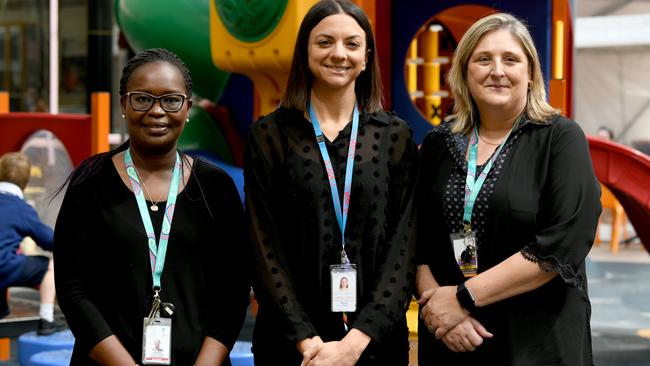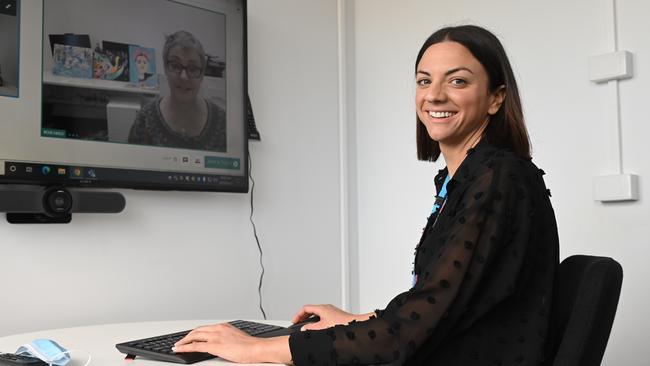Damning report on children’s mental health treatment at WCH
SA children are self-harming in the ED, being sent home in taxis and turned away from hospital, even though mental health beds are available, a report shows.
SA News
Don't miss out on the headlines from SA News. Followed categories will be added to My News.
Children self-harming in the emergency department, sent home in taxis and turned away from hospital when seeking mental health treatment are among concerns revealed in a report by the Chief Psychiatrist.
Dr John Brayley’s inquiry was sparked by complaints from parents who say their children were discharged from the Women’s and Children’s Hospital while “still at risk of self-harm or suicide”.
This is despite the hospital’s 12-bed psychiatric ward, Mallee Ward, not being full, he said.
The report, tabled in parliament on Thursday, said parents “felt they were leaving (the WCH) without any plans or support and that they were still unsure as to how to help their child”.
It made five recommendations, including the WCH develop safety plans for families when children are discharged, consider a plan for short-term admissions to Mallee Ward and consider reviewing emergency mental health presentations the following day.
Ahead of the release of the report, the state government confirmed six new mental health nurses had begun working at the WCH.

They will specialise in emergency assessments, working with multicultural children and those with neurodevelopmental disorders such as autism and supporting children at home and after discharge from hospital.
Health Minister Chris Picton said recruitment of the nurses had been fast-tracked and another 15 child psychiatrists and psychologists would be hired soon.
Mr Picton said there had been a 37 per cent spike in mental health presentations at the WCH emergency department over the past two years.
“I have met many of these families and seen first-hand what they have been through, and it’s clear more needs to be done,” he said.
Women’s and Children’s Health Network CEO Lindsey Gough said work had already been done to address some of Dr Brayley’s recommendations “and others require longer-term planning”.
A mobile RACER team – Rapid Assessment Consultation Evaluation and Review – was recently launched to provide support to young people to reduce the likelihood they will need to return to hospital.

However, advocacy group Parents for Change – which referred cases to Dr Brayley – said not every child received the same level of support when they ended up in the emergency department.
In six cases examined by Dr Brayley's office, parents said their children faced long wait times, were given “vague” explanations about why they could not be admitted and felt mental health assessments were “too brief”.
Parents for Change co-founder Anne-marie Taplin said some children were assessed in corridors and not asked about their history of self-harm, diagnosis or medications or if they had attended the WCH for mental health concerns before.
Ms Taplin said many families felt dismissed and were given the impression the WCH was “a place for physical injuries”.
“They deserve the same compassionate response as someone with a physical injury or health condition … not a brief public conversation in a loud, busy hallway, only to be turned away with no help at all,” she said.
Dr Brayley’s report notes it is “reasonable” for young people in mental health crisis “to attend an emergency department for this, as they would for urgent treatment of a physical disorder such as asthma, allergy (or) pain”.
Dr Brayley’s inquiry also examined 108 complaints and 146 critical incidents recorded by the WCH, which revealed concerns including young people were:
DISCHARGED early or without preparation and support.
SENT home in taxis alone on two occasions.
NOT receiving assessment or treatment for self-harm or suicidal behaviours, despite presenting with these issues.
BEING told Mallee Ward “was not appropriate” but “no other assistance or alternatives were provided”.
Dr Brayley noted that incidents including “patients self-harming in the waiting room in ED” and “absconding and being escorted by security” were written about in case files but were not reported among the 146 critical incidents.
This meant it was “unclear” if the data “truly reflects” the number of incidents occurring.
Dr Brayley stressed “skilled and dedicated” health workers were “responding to increased emergency demand” and “need access to more follow-up options for the patients they see”.





